| AA I would say yes but a
lot of people put a lot of emphasis on the Internet, and it turned
out to be a big mistake, because if you walk around where most
of Silicon Alley was based—all it is is empty buildings.
And I think that a lot of people were getting into the technology
business...you know, the Internet companies paid outrageous
salaries but couldn't afford to pay those salaries and people
who had Flash animation skills all of a sudden thought they
were animators and had this ability to do high-end stuff, and
the reality is they couldn't.
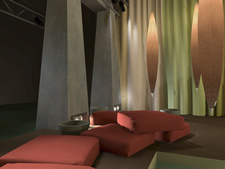
AFR In terms of animation and effects, what types of
clients are you going after?
AA We are interested in doing a lot of things. We decided
that doing films, for example, is not a great money maker. People
who are doing film are running at a loss or breaking even. So
we decided we were going to be a 3D company.
People that do Photoshop do Photoshop for everything, right?
AFR Right.
AA There's not this, 'oh, you do Photoshop for advertising,
you do Photoshop for film'...they do Photoshop. So we
decided we have Maya, Lightwave 2D/3D artist, and they are not
just people who can work on one medium. So we decided that we
would explore the market of games, Web 3D—as it grows—commecials...and
films.
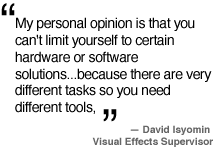
But we don't want to do 300 shots of a film because we can't
see how a company makes money doing 300 shots. We just want
to do five. Because if you do five shots you can make more money
then if you are doing 300.
AFR Is that also a factor of just how small or large
a firm is?
AA Yes, but it is also overhead doing all those shots,
because it becomes a bigger headache, it becomes an assembly
line.
AFR Is gaming the most lucrative 3D market right now?
AA I would say commercials and games. Quite a few architects
end up working at special effects houses because of the fact
that it pays well.
AFR Let's move on to some of the people of Luminetik...the
folks behind the film and animation side of the business.
AA OK. Well David Isyomin is our Visual Effects Supervisor
and Mark Hatlan is the Supervising Animator. David has worked
for Digital Domain.
AFR Well, my next question is for him then. David, can
you talk about the films you have worked on and the tools you
have used?
DI Sure. Before Luminetik I worked for Digital Domain
doing film, television and commercials as a visual effects supervisor.
AFR What films have you worked on? And what are some
of the tools you have used?
Continued
at below left.
|
|
MH I use a couple. I use Lightwave on the Mac for most
of the modeling and I use Maya on the PC because Maya has extra
tools that Lightwave can't handle. And Lightwave has things
that Maya can't do. Those are the main packages I use for 3D.
AFR As an animator do you think the Mac platform is
suitable for animation? Do you have all the tools you need?
MH The Mac has a smaller user set for 3D. I am disappointed
because I love my Mac. Personally speaking
I think it is a better operating system than Windows. It is
easier to deal with and just more friendly. I would rather do
anything on a Mac over a PC if I had a choice.
AFR Can you complete a large project solely on a Mac?
MH Yes, I have many times.

AFR Tell me about your pipeline...what makes Luminetik
different than other 3D studios?
AA We wanted to form a different type of business model
where we would try to keep the overhead down. We would look
at every type of technology that we could so that we could find
something that we can use and not have to develop proprietary
software. This saves the client money.
And we wanted to streamline the pipeline so that we didn't
have 15 copies of Maya and also 15 copies of Softimage and only
one person using them. Moreover, we also wanted a smaller boutique
style house because in many of the special effects houses people
don't communicate very well and...you know you've got one team
working on something, and you have another team working on something
else, but there isn't somebody in the middle really communicating
the ideas well. And so when they come together with their shots
they don't match.
AFR Right, I understand that well from the architecture
field too...(laughter).
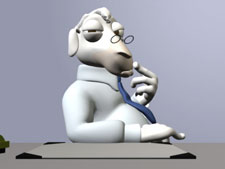
AA And we found another
thing that was very interesting, in that there is always six
people—with usually about $300,000 in salaries—doing
a job.
So we decided that we wanted to create a new 'super-animator'
who can do all those things. And rather than paying six guys
each at $50,000 we wanted to pay another guy $75,000-$100,000
who can do all of it. And also streamline our pipeline at the
same time.
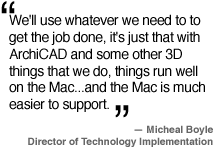
AFR So why is Luminetik primarily a Mac-based studio?
AA It's cost effective, they are easy to use, they are
easy to configure... as far as the pipeline they save us money.
The clients can actually use them easily, for example, if they
have to send us something over the Internet and they are working
on something else; Macs are easier to work with other people
and platforms.
Michael Boyle, our Director of Technology Implementation can
probably speak to this question as well.
Continued
at below right.
|
|
DI I was involved in Dantes Peak, Titanic, and Mystic
and other projects in various capacities. When you have such
projects you try to find the best tools for the task.
My personal opinion is that you can't
limit yourself to certain hardware and software solutions...because
there are very different tasks so you need different tools,
especially when hardware and software are evolving so fast you
have to watch for the best possible solution.
AFR Well, what are the tools you are using now at Luminetik?
DI I use a combination of Adobe applications on both
PC and Macintosh platforms. If you have to do digital painting
I think the Macintosh solution is the best because it is already
the pros' choice for the graphic applications in terms of color
correction.
AFR Is the Mac's ColorSync
technology a big factor in video and post production work?
DI Yes...you know the biggest challenge when you work
in these environments with different monitors is you need continuity
between shots. If there are three people working on different
shots in the same sequence you have to make sure the shots look
similar and you need your monitors to be color calibrated well.
It is very difficult to calibrate monitors so it is basically
guess work. If you do 3D rendering ultimately your product is
the image and if you are not really sure what you are looking
at you can't deliver good quality.
Apple gives you the best tools to do this and the hardware
is geared up to this task.
AFR What was your role on Titanic?
DI On Titanic I was on the team that pretty much did
the second part of the production and I was doing a lot of consulting
types of things. I was overseeing the weathering and water shots,
people and things like that. I did some compositing of some
shots. I was involved in the integration of live action movements.
AFR Is your role at Luminetik similar to your role at
Digital Domain?
DI It is a little wider because visual effects supervision
involves more than producing computer generated elements.
AFR And Mark what is your role as Supervising Animator?
MH I do a large portion of 3D models, animation, ideas
and execution of the 3D. And I do a lot of product modeling,
character and development.
AFR What is your main animation application?
Continued
top right column - >
|
|
AFR Mike, why is the Mac so important to your pipeline?
MB The Mac suits our needs for getting the job done
quickly and easily. I mean, that's one reason. We'll use whatever
we need to get the job done, it's just that with ArchiCAD
and some of the other 3D things that we do, things run well
on the Mac, and the Mac is much easier to support.
AFR Is it really then economics that are driving the
whole issue or is there more to it than that?
MB I don't know if it is economics...it's more of just
ease of support. For us, on the Mac there is not the level of
driver issues and support nightmares that there are on the PC.
It's just so much more transparent in terms of plug-and-play.
You put something in there and it works. There is nothing to
load...you know. The number of issues we have on the Macs is
drastically less than we have on the PC's.
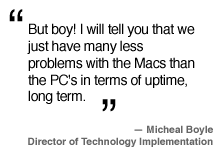
AFR I see.
MB
Especially with these higher-end apps like Lightwave 3D and
everything else.
AFR
Now you are using Unix, NT and the Mac OS. How would you rank
the platforms in terms of being up for you when you need them?
MB Well....ah, Unix is 99% of
the time always there. Very very rarely do we have problems
with those machines, which are mostly the servers which we don't
do much on. In terms of workstations, the Macs are definitely
higher...up times are much higher than the PC's.
It's always something crazy with the
PC's, whether it's a video card or a network card that is nonstandard.
We try to stay with standard configurations as much as possible
to ease that. But boy! I will tell that we just have many less
problems with the Macs than the PCs in terms of uptime, long
term.
AFR Right, now you have some Unix
servers, how are you guys configured to store your files while
you work...and then archiving them later?
MB Well...actually a couple of
Mac servers primarily.
AFR Really?
MB Ya (laughter)...Once
again, they are, maintenance-wise, very easy and they support
all the major platforms in terms of clients, and there is no
downtime in terms of those.
|






![]()
![]()